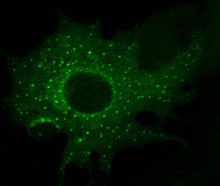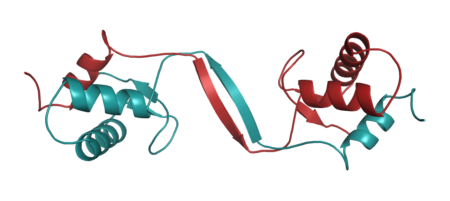

Mariann Bienz obtained her degree and PhD at the University of Zürich and, after five years of postdoctoral studies at the LMB, returned to Zürich in 1986 to take up a faculty position at the Department of Zoology. In 1991, she moved back to Cambridge to join the LMB as a Group Leader in the Cell Biology Division. She became Head of this Division in 2006, but then switched to PNAC where she continued as Divisional Head until 2018 when she took up the role of Deputy Director of the LMB.
Her early work in Zürich examined how developmental control genes are transcribed in relation to the position of cells in the embryo. Here she pioneered the use of the embryonic midgut of the fruit fly Drosophila as a model system. She thus discovered an inductive cascade that originates in the visceral mesoderm that envelops the midgut and results in the patterning of the underlying midgut epithelium. One of the signals in this process is Wnt, which plays a key role in specifying different cell types in the midgut epithelium in a dose-dependent manner.
On her return to the LMB, Mariann began to focus on the molecular mechanism that govern the transduction of Wnt signal from the cell membrane to the nucleus. This shift towards mechanistic studies was largely motivated by emerging evidence that inappropriate activation of the Wnt pathway is a major driver of cancer in many tissues. Elucidating the molecular details of this pathway was therefore paramount and had the potential to reveal new therapeutic targets for treating cancer. Her initial focus on the transcriptional response to Wnt signalling culminated in the discovery of the Wnt enhanceosome, a multiprotein complex generating a transcriptional output in response to Wnt signalling by integrating Wnt with other signals and positional information from cell-type specific transcription factors. She also discovered the key role of Dishevelled in assembling Wnt signalosomes through dynamic head-to-tail polymerisation. The latter enhances the binding avidity of signalosome components for their effectors transiently and reversibly, which proved to be a wide-spread mechanistic principle underlying numerous biological processes in all kingdoms of life.

Mariann was elected a Member of the European Molecular Biology Organisation in 1989, a Fellow of the Royal Society in 2003 and a Fellow of the Academy of Medical Sciences in 2006. She received the Friedrich Miescher Prize of the Swiss Biochemical Society in 1990. She served on numerous Grant and Career Panels, Scientific Advisory Boards and Councils in the UK and abroad.
Selected Papers
- Schwarz-Romond T, Fiedler M, Shibata N, Butler PGJ, Kikuchi A, Higuchi Y & Bienz M (2007)
The DIX domain of Dishevelled triggers Wnt signalling by dynamic polymerization
Nature Struct Mol Biol 14: 484-492 - Fiedler, M., Graeb, M., Mieszczanek, J., Rutherford, T.J., Johnson, C.M. and Bienz, M. (2015)
An ancient Pygo-dependent Wnt enhanceosome integrated by Chip/LDB-SSDP
eLifee09073 - Gammons M, Renko M, Johnson CM, Rutherford TJ & Bienz M (2016)
Wnt signalosome assembly by DEP domain swapping of Dishevelled
Mol Cell 64: 92-104 - van Tienen LM, Mieszczanek J, Fiedler M, Rutherford TJ & Bienz M (2017)
Constitutive scaffolding of multiple Wnt enhanceosome components by Legless/BCL9
eLife 6: e20882 - van Dop, M., Fiedler, M., Mutte, S., de Keijzer, J., Olijslagers, L., Albrecht, C., Liao, C-Y., Janson, M., Bienz, M. and Weijers, D (2020)
DIX domain polymerization drives assembly of plant cell polarity complexes
Cell 180: 427-439 - Bienz, M. (2020)
Head-to-tail polymerization in the assembly of biomolecular condensates.
Cell 182: 799-811.

